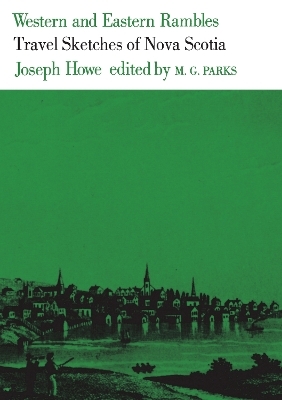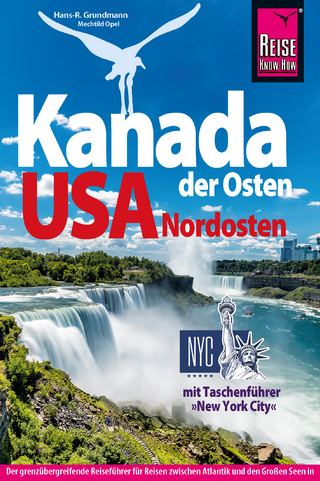
Western and Eastern Rambles
Travel Sketches of Nova Scotia
Seiten
1973
University of Toronto Press (Verlag)
978-0-8020-6183-6 (ISBN)
University of Toronto Press (Verlag)
978-0-8020-6183-6 (ISBN)
Joseph Howe was not yet a prominent politician in 1828, when he began publishing in the Novascotian a series of sketches which form a literary composite of his business trips around the province. In these Rambles he spoke as an observer bent on recording his impressions of his native province.
Joseph Howe was not yet a prominent politician in 1828 but he was already developing a deep interest in the political institutions of Nova Scotia, and his love of the land and its people was innate. In that year he began publishing, in the Novascotian of which he was then editor, a series of sketches which form a literary composite of his business trips around the province, from Halifax to Digby in the west and Guysborough in the east. In these Rambles he put aside his professional preoccupations and spoke as an observer bent on recording his impressions of the landscapes, settlements, people, and character of his native province. He wrote as an urbanely perceptive editor, running the gamut for ecstatic celebration of provincial beauties and virtues to criticism, direct or oblique, of provincial shortcomings and foibles. His youthful energy and immensely attractive enthusiasm are apparent on every page.
The sketches furnish a first-hand account of the Nova Scotian countryside as it was nearly a century and a half ago. They reveal a deeply involved insider's interpretation of provincial life, and something of the attitudes, interests, tastes, and literary talents of a famous person known directly to most people only through the more formal modes of political speech and public letter. Any well-written account of colonial times is of interest and value to a nation involved in an ever deepening study of its past; when the author happens to be Joseph Howe, a man of unusual perception and distinction, the account assumes more than ordinary stature. Howe's non-political writing has been unduly neglected. The rescue of the Rambles from the dusty files of the Novascotian will help to right the balance.
Joseph Howe was not yet a prominent politician in 1828 but he was already developing a deep interest in the political institutions of Nova Scotia, and his love of the land and its people was innate. In that year he began publishing, in the Novascotian of which he was then editor, a series of sketches which form a literary composite of his business trips around the province, from Halifax to Digby in the west and Guysborough in the east. In these Rambles he put aside his professional preoccupations and spoke as an observer bent on recording his impressions of the landscapes, settlements, people, and character of his native province. He wrote as an urbanely perceptive editor, running the gamut for ecstatic celebration of provincial beauties and virtues to criticism, direct or oblique, of provincial shortcomings and foibles. His youthful energy and immensely attractive enthusiasm are apparent on every page.
The sketches furnish a first-hand account of the Nova Scotian countryside as it was nearly a century and a half ago. They reveal a deeply involved insider's interpretation of provincial life, and something of the attitudes, interests, tastes, and literary talents of a famous person known directly to most people only through the more formal modes of political speech and public letter. Any well-written account of colonial times is of interest and value to a nation involved in an ever deepening study of its past; when the author happens to be Joseph Howe, a man of unusual perception and distinction, the account assumes more than ordinary stature. Howe's non-political writing has been unduly neglected. The rescue of the Rambles from the dusty files of the Novascotian will help to right the balance.
Joseph Howe (1804-73) was owner, publisher, and editor of the NovaScotian, one of the best newspapers in British North America; leader of the Reform (Liberal) party in Nova Scotia and many times member of its Legislative Assembly; successful champion of the freedom of the press; premier of Nova Scotia; member of parliament and the dominion cabinet; president of the Privy Council; secretary of state for the Canadian provinces; lieutenant-governor of Nova Scotia. M.G. Parks was the chairman of the Department of English of Dalhousie University, Halifax.
| Erscheint lt. Verlag | 15.12.1973 |
|---|---|
| Reihe/Serie | Heritage |
| Zusatzinfo | h/ts, maps throughout |
| Verlagsort | Toronto |
| Sprache | englisch |
| Maße | 147 x 211 mm |
| Gewicht | 280 g |
| Themenwelt | Reiseführer ► Nord- / Mittelamerika ► Kanada |
| Geisteswissenschaften ► Geschichte ► Regional- / Ländergeschichte | |
| ISBN-10 | 0-8020-6183-4 / 0802061834 |
| ISBN-13 | 978-0-8020-6183-6 / 9780802061836 |
| Zustand | Neuware |
| Haben Sie eine Frage zum Produkt? |
Mehr entdecken
aus dem Bereich
aus dem Bereich


